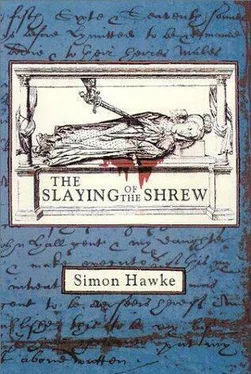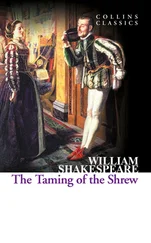Simon Hawke - The Slaying Of The Shrew
Здесь есть возможность читать онлайн «Simon Hawke - The Slaying Of The Shrew» весь текст электронной книги совершенно бесплатно (целиком полную версию без сокращений). В некоторых случаях можно слушать аудио, скачать через торрент в формате fb2 и присутствует краткое содержание. Жанр: Исторический детектив, на английском языке. Описание произведения, (предисловие) а так же отзывы посетителей доступны на портале библиотеки ЛибКат.
- Название:The Slaying Of The Shrew
- Автор:
- Жанр:
- Год:неизвестен
- ISBN:нет данных
- Рейтинг книги:5 / 5. Голосов: 1
-
Избранное:Добавить в избранное
- Отзывы:
-
Ваша оценка:
- 100
- 1
- 2
- 3
- 4
- 5
The Slaying Of The Shrew: краткое содержание, описание и аннотация
Предлагаем к чтению аннотацию, описание, краткое содержание или предисловие (зависит от того, что написал сам автор книги «The Slaying Of The Shrew»). Если вы не нашли необходимую информацию о книге — напишите в комментариях, мы постараемся отыскать её.
The Slaying Of The Shrew — читать онлайн бесплатно полную книгу (весь текст) целиком
Ниже представлен текст книги, разбитый по страницам. Система сохранения места последней прочитанной страницы, позволяет с удобством читать онлайн бесплатно книгу «The Slaying Of The Shrew», без необходимости каждый раз заново искать на чём Вы остановились. Поставьте закладку, и сможете в любой момент перейти на страницу, на которой закончили чтение.
Интервал:
Закладка:
Like the apothecary shop below, the walls were all but covered with wooden shelves crammed full of books and earthen jars, curious looking wooden carvings and small statuary made of stone, clay pots of every shape and size, necklaces and amulets of every description, little leather pouches suspended from thongs with who knew what sort of strange talismans contained therein… Shakespeare imagined eyes of newts and wings of bats and pulverized horn of unicorn. Everywhere he looked, there was something wonderfully different and strange to arrest his attention.
“Freddy, I was wondering…” he began as he turned around, then stopped abruptly when he saw that Freddy was not there. He frowned. He could have sworn that Freddy had come up the stairs right behind him. In fact, he was certain that he had. He made a wry grimace and shook his head. “The man moves like a ghost,” he said to himself.
“Not all ghosts move quietly,” said a soft, low voice from behind him.
He started when she spoke and turned around again to see Granny Meg standing by the table in front of the fireplace. It seemed as if she had simply appeared from out of nowhere. Clearly, she must have come from behind the screen at the far end of the room, by the window, but she was barefoot and had moved so quietly that he had not heard her footsteps. He tried to recall if Freddy had been barefoot also, but he had not noticed, and with his floor-length robe, it would have been difficult to tell, in any case.
Once again, he was struck by how ageless Granny Meg appeared. She was no longer young, but her skin was so fair and clear as to be almost translucent, without a single blemish or wrinkle. She was of average height, girlishly slim, and sharp-featured, with a pointed chin, high cheekbones, and a delicate, thin nose. Her thick, silvery-gray hair hung down to her waist. She had worn it loose the first time he had seen her, but now she had it plaited into one thick braid that hung down the left side of her chest and was held with simple rawhide thongs. She wore a simple homespun gown, lightly and delicately embroidered with green vines and flowers around the neckline. Her voice was low and mellifluous, memorable certainly, but not nearly so much as her eyes, which were an unusual, striking shade of pale grayish blue, so light that they seemed to absorb light and reflect it. And she seemed to be surrounded by a brightly glowing, pulsating aura.
Shakespeare blinked, taken aback, and then realized that it was but a momentary illusion of the firelight on the hearth behind her. He smiled, thinking of how easily his imagination ran away with him each time he came here. It was, after all, nothing more than an ordinary apothecary shop.
“I was thinking that surely no ghost could move as quietly as you, madame,” Shakespeare said. “You gave me a bit of a start.”
She smiled. “Forgive me. The floorboards here are stout, and these old bones are very light.”
“ ‘Tis good to see you once more, Granny Meg. Good day to you. I am given to understand I was expected?”
She shrugged, a very spare and graceful gesture. “I had a strong presentiment that I would be seeing you today.”
“And lo, here I am.”
“There you are.” She indicated one of the chairs at the table. “Please, be seated.”
He took the chair and she sat down across from him.
“You are very troubled,” she said.
“Indeed. You can divine that much already?”
“I can divine that simply by looking at your face,” she replied, raising her eyebrows. “You wear a very troubled look.”
“Ah. Well…” He nodded. “I am troubled, ‘tis true. Very much troubled. Something has happened… something both unfortunate and terrible. There has been a murder… or at the very least, it seems very like a murder. A young woman is dead and it appears as if there may have been foul play. Indeed, we very much suspect so.”
“We?” she asked.
“The esteemed Sir William Worley, Tuck Smythe, and my humble self,” Shakespeare replied.
She nodded. “I have heard much of Sir William, and I remember Tuck, of course. Go on.”
“Well…” He paused a moment, collecting his thoughts. “The poor, unfortunate girl… ‘twas to be her wedding day, you see, and her father had prepared a most elaborate and lavish celebration at his estate outside the city. We players were to participate, which is why Tuck and I were there, of course, and Sir William was one of the illustrious invited guests. There was to be a fair, and a grand progress on the river with the bride in costume as Queen Cleopatra arriving on her royal barge. All went well, as had been planned, until the arrival of the bride, who tragically turned up dead upon her throne. And beside her body, I found this…” He took out the flask. “ ‘Twould appear that she was drinking from this flask to ward off the chill upon the river. Tis brand, burnt wine, but ‘twas mixed with something else, methinks, some foreign matter. There is a curious sort of odor, one the girl no doubt could not discern, which would be no great surprise if she were not accustomed to the drink. I believe it may contain a deadly poison.”
“And so you seek to have me confirm what you believe,” Granny Meg said.
“Aye, ‘twould prove that murder had been done,” said Shakespeare, grimly. “And perhaps, if we knew the nature of the poison and where it might have been obtained, then ‘tis possible we might learn who had obtained it. Sir William will see to it, of course, that your efforts in this matter are rewarded.”
Granny Meg nodded. “Let me see the flask.”
Shakespeare passed it to her across the table, but the moment her hand came in contact with the flask, Granny Meg stiffened and a frown crossed her features. Her grasp tightened on the flask. She closed her eyes and shook her head, as if to dispel whatever perception or sensation she had just experienced, or else deny it, then she unstoppered the flask and brought it up close to her lips, as if she were about to drink, only instead her nostrils flared delicately as she sniffed its contents once, and once only, whereupon she set the flask down and abruptly got up from the table.
Shakespeare could no longer contain himself. She knew what it was, that much seemed certain from her reaction. She had turned away from him and was staring intently into the flames upon the hearth. Clearly, she was greatly troubled.
“I can see that you recognized the odor,” he said, softly. “I was right, was I not?”
Granny Meg kept staring into the flames as she slowly shook her head. “No. You were not.”
He was completely taken aback by her reply. It did not seem possible. He had been so certain. “ ‘Tis not poison?” he said. “Are you certain?”
“I should think I ought to know,” Granny Meg replied. “I had prepared it myself.”
“What?” He stared at her, eyes wide with astonishment. “You prepared this flask?”
“Not the flask,” she replied, “but ‘twas I who mixed the potion that went into it. ‘Tis an ancient blend of certain rare herbs and distillations, comingled with some common plants that can be found simply growing wild by the roadside. But the effect that it produces is not common at all.”
“But… you just said ‘twas not a poison,” Shakespeare said. “And yet Catherine Middleton is dead!”
Granny Meg turned back towards him and shook her head. “ ‘Twas not the name she gave me, though I had a feeling that the name she gave was false. That alone might have dissuaded me from helping her, yet she came well recommended. If she was the bride of whom you speak, the one who drank this potion, then most assuredly it did not kill her.”
Shakespeare pushed back his chair and stood. “Granny Meg, I was there! With my own eyes, I saw her lifeless body! She neither moved nor took a breath! Tuck listened at her chest and said her heart had ceased to beat! Odd’s blood, if she came to you for some sort of tonic and by mishap you had made some dreadful error in the concoction that resulted in her death, why then… this terrible tragedy is your responsibility!”
Читать дальшеИнтервал:
Закладка:
Похожие книги на «The Slaying Of The Shrew»
Представляем Вашему вниманию похожие книги на «The Slaying Of The Shrew» списком для выбора. Мы отобрали схожую по названию и смыслу литературу в надежде предоставить читателям больше вариантов отыскать новые, интересные, ещё непрочитанные произведения.
Обсуждение, отзывы о книге «The Slaying Of The Shrew» и просто собственные мнения читателей. Оставьте ваши комментарии, напишите, что Вы думаете о произведении, его смысле или главных героях. Укажите что конкретно понравилось, а что нет, и почему Вы так считаете.












